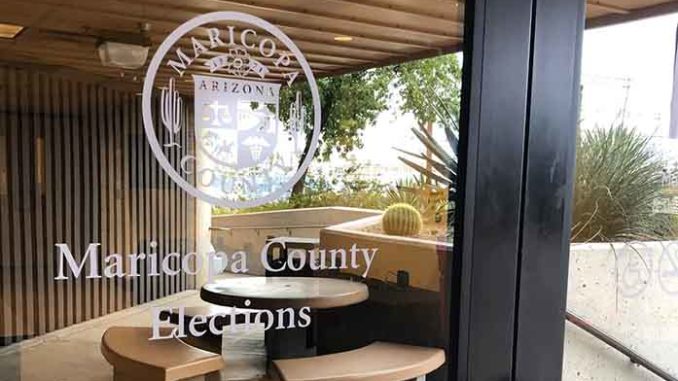
by Ethan Faverino | Jan 10, 2026 | News
By Ethan Faverino |
The Department of Homeland Security (DHS) and U.S. Customs and Border Patrol Protection (CBP) announced that border security metrics have reached new highs in effectiveness, marked by declining encounters, zero releases of apprehended individuals, surging drug seizures, dramatic reductions in Arizona crossings, and major investments in advanced border infrastructure.
Preliminary CBP data for November 2025 showed total nationwide encounters dropping to 30,367—lower than October’s historic low of 30,573—and marked the seventh consecutive month of zero releases into the United States. Every individual that was apprehended by U.S. Border Patrol (USBP) was processed according to law, a milestone described as unmatched in modern border history.
“Once again, we have a record low number of encounters at the border and the 7th straight month of zero releases. Month after month, we are delivering results that were once thought impossible: the most secure border in history and unmatched enforcement successes,” said Secretary Kristi Noem. “Thanks to President Trump’s leadership and the dedication of DHS law enforcement, America’s borders are safer than ever before.”
CBP Commissioner Rodney Scott added, “Our focus is unwavering: secure the border, enforce the law, and protect this nation. These numbers reflect the tireless efforts of our agents and officers who are delivering results that redefine border security. We’re not slowing down. We’re setting the pace for the future.”
Key highlights from the data include:
- The lowest start to any fiscal year on record, with only 60,940 total nationwide encounters in October and November—28% below the previous low of 84,293 in FY2012.
- From January 21 through November, total enforcement encounters along the southwest border stood at 117,105—37% less than the Biden administration’s monthly average of 185,625.
- USBP nationwide apprehensions have averaged under 10,000 per month since President Trump took office.
- Southwest border daily average apprehensions fell to 245 per day—a 95% reduction from the prior administration’s average of 5,110 per day.
Drug interdiction efforts also intensified, with nationwide seizures totaling 54,947 pounds in November—a 33% increase from October. Fentanyl seizures rose 59% to 1,543 pounds, methamphetamine seizures surged 118% to 21,935 pounds, and cocaine seizures increased 40% to 8,420 pounds.
In Arizona, illegal border crossings have plummeted under the current administration. FY2025 saw 63,813 apprehensions, a fraction of the prior years’ totals: 564,215 in FY24, 576,901 in FY23, and 571,720 in FY22.
This represents an approximate reduction of 92% from illegal entries and gotaways during the Biden administration, with FY25 apprehensions 66% lower than those in the Biden era.
To further fortify these gains, DHS and CBP announced five new contracts totaling $3.3 billion for “Smart Wall” construction in Texas and Arizona, bringing the total Smart Wall contracts to $8 billion.
The contracts, issued in November and December 2025, will add 97 miles of primary border wall, 19 miles of secondary wall, 66 miles of waterborne barrier system, and extensive detection technology (including 149 miles in areas with existing barriers).
The Tucson 2 Wall Project will construct approximately 19 miles of primary and secondary wall plus 136 miles of detection technology in Arizona’s Tucson sector.
“Securing our border is key to protecting our country, keeping our communities safe, and making sure our immigration system works the way it should, said CBP Commissioner Rodney Scott. “A border wall with the right technology—a Smart Wall—is an important tool to stop illegal activity and to help agents do their job, which is critical in keeping America safe.”
Ethan Faverino is a reporter for AZ Free News. You can send him news tips using this link.

by Ethan Faverino | Jan 9, 2026 | News
By Ethan Faverino |
Maricopa County Elections’ latest newsletter, released January 1, 2026, delivered key updates for upcoming elections, including precinct boundary changes, opportunities to support upcoming elections, and important dates for the 2026 election cycle.
The Maricopa County Board of Supervisors recently approved 235 voting precinct changes, which took effect on January 2, 2026, eliminating precincts with zero voters, aligning boundaries with major freeways, reducing overall precinct sizes for better manageability, and minimizing splits across cities, towns, and school districts.
These adjustments aim to accommodate ongoing population growth across the county and ensure sufficient precinct capacity to support efficient in-person voting operations. Additionally, the Board established a new Justice Court District in the West Valley, named Canyon Trails.
Maricopa County Elections also continues its search for community partners willing to host Vote Centers for the 2026 election season. By providing a suitable space, hosts play a direct role in strengthening election access and supporting participation in the community.
Ideal Vote Center locations must meet the following requirements:
- Minimum room size of 1,600 square feet
- Full ADA accessibility
- Reliable power and air conditioning
- Ample parking to handle high voter traffic
Hosts may commit to one of several durations: 27 days, 12 days, 4 days, 2 days, or 1 day, depending on the election period and location needs.
For the City of Tempe, Maricopa County Elections will conduct an all-mail election on March 10, 2026. Under Arizona law, eligible voters will automatically receive a ballot by mail. The voter registration deadline for this election is February 9, 2026.
Replacement ballots will be available for in-person voting starting March 3, 2026, at the Tempe History Museum.
Maricopa County Elections serves as the filing officer for a range of countywide elected offices, including Justice of the Peace, Constable, Judges seeking retention, Special Taxing Districts, and Precinct Committeemen.
To assist prospective candidates, Maricopa County Elections will host the following virtual training sessions:
- January 13 and February 5, 2026 – General candidate training
- January 15 and February 3, 2026 – Precinct Committeeman training
Ethan Faverino is a reporter for AZ Free News. You can send him news tips using this link.

by Ethan Faverino | Jan 8, 2026 | Economy, News
By Ethan Faverino |
As Arizona lawmakers prepare to convene for the 2026 legislative session, a leading nonpartisan think tank is warning of a demanding agenda driven by fiscal discipline, persistent housing shortages, and critical water policy decisions.
Katie Ratlief, Executive Director of the Common Sense Institute (CSI), emphasized the need for urgent action from the Legislature and Governor Katie Hobbs to address these issues. In a recent report by The Center Square, Ratlief highlighted that the session will require decisive leadership to tackle spending trends, affordability barriers, and the state’s long-term water security.
Arizona’s budget has expanded significantly over the past decade, rising from approximately $10 billion to nearly $18 billion, with $6 billion of that increase occurring in just the last five years. Ratlief urged policymakers to rein in spending increases and reassess recent commitments to determine whether they remain necessary, warning against expenditures outpacing economic growth.
Housing affordability remains a top concern for CSI Arizona, with the latest quarterly report underscoring ongoing challenges despite some cooling in the market. The average home price stands at $426,164—$53,400 more expensive than pre-pandemic trends—leaving households facing high costs amid elevated mortgage rates.
According to CSI Senior Economist and Research Analyst Zachary Milne, Arizonans now need to work more than 64 hours per month, at the average wage, just to afford a typical home payment, significantly up from the historical average of 45 hours.
Real-time estimates show an instantaneous housing shortfall of 52,846 units in Q2 2025, a 6.9% improvement from the revised 56,812 units in 2024. Arizona faces a cumulative housing deficit of 121,334 units, as of 2024, reflecting years of inadequate construction relative to population growth.
Ratlief believes the housing shortfall is not the result of state policy but of holdups originating within cities, noting that local governments control permitting, building codes, and enforcement—factors that can significantly slow housing development.
CSI revealed that most Arizona counties—including Maricopa, with a projected deficit of 34,737 units—are falling behind demand. Even with recent improvements in permitting, Maricopa County is still building thousands of units short of what is needed annually.
Water policy will also dominate discussions this legislative session, as ongoing negotiations over the Colorado River allocations approach a pivotal February 14, 2026, deadline set by the U.S. Department of the Interior.
This is viewed as likely the final opportunity for the seven basin states to reach a consensus agreement on sharing the river’s water before current operating guidelines expire at the end of the year. With Arizona’s unique constitutional requirement, any agreement reached will require legislative approval, setting the stage for intense debate in the 2026 session. Ratlief indicated that if states finalize a deal, the Legislature will debate and vote on authorizing the Department of Water Resources to sign on, potentially shaping Arizona’s water future for decades.
Ethan Faverino is a reporter for AZ Free News. You can send him news tips using this link.

by Ethan Faverino | Jan 6, 2026 | Education, News
By Ethan Faverino |
As the tech industry continues to boom, the Bureau of Labor Statistics projects over 317,700 annual job openings in tech and computing fields through 2034, far outpacing other sectors.
Arizona, home to a growing tech scene, ranks 44th out of 50 states for pursuing a tech career, according to research by TryHackMe. The study highlights how tech graduates in Arizona earn 52.5% more than the average graduate but face higher costs and lower overall prospects compared to top-performing states like Alaska, Wyoming, and Utah.
The analysis evaluated states on key factors, including the average annual cost of a tech degree, the number of schools offering tech courses, median earnings for tech graduates four years after graduation, and how those earnings compare to the median for all graduates.
Arizona ranked 44th overall with a score of just 2.65 out of 10, highlighting notable challenges for tech career growth. Despite having 120 institutions that offer tech-related programs, the average annual tuition of $19,310 remains a significant financial barrier for many students.
Four years post-graduation, tech alumni in Arizona earn a median salary of $51,705—52.5% above the state average of $33,894 for all graduates. These earnings still trail behind many other states, where tech graduates see even greater returns on their investments.
The top 5 destinations for tech careers are:
- Alaska (Score: 7.31/10) – Average annual cost of tuition: $12,982; Schools: 9; Median tech earnings: $76,773 (146.1% more than the state average of $31,197).
- Wyoming (Score: 7.02/10) – Average annual cost of tuition: $10,537; Schools: 10; Median tech earnings: $60,313 (50.6% more than the state average of $40,050).
- Utah (Score: 6.89/10) – Average annual cost of tuition: $16,387; Schools: 63; Median tech earnings: $74,702 (152.1% more than the state average of $29,635).
- Kentucky (Score: 6.25/10) – Average annual cost of tuition: $14,657; Schools: 87; Median tech earnings: $49,798 (58.3% more than the state average of $31,450).
- Maryland (Score: 6.14/10) – Average annual cost of tuition: $16,875; Schools: 80; Median tech earnings: $66,943 (65.9% more than the state average of $40,342).
The top 5 worst destinations for tech careers are:
- Rhode Island (Score: 1.04/10) – Average annual cost of tuition: $26,628; Schools: 22; Median tech earnings: $67,325 (52.0% more than the state average of $44,287).
- New Hampshire (Score: 2.25/10) – Average annual cost of tuition: $20,505; Schools: 33; Median tech earnings: $71,109 (72.0% more than the state average of $41,336).
- Maine (Score: 2.28/10) – Average annual cost of tuition: $17,755; Schools: 37; Median tech earnings: $58,611 (44.1% more than the state average of $40,682).
- Pennsylvania (Score: 2.51/10) – Average annual cost of tuition: $20,603; Schools: 331; Median tech earnings: $56,834 (38.5% more than the state average of $41,024).
- Minnesota (Score: 2.55/10) – Average annual cost of tuition: $17,238; Schools: 108; Median tech earnings: $66,383 (56.5% more than the state average of $42,414).
“The prospects for tech graduates are among the best in any field, and it’s only set to grow stronger with the Bureau of Labor Statistics projecting that tech is likely to have a bigger job boom than most sectors,” said Ben Spring, Co-founder of TryHackMe. “This study highlights where in the US, tech graduates will see the best prospects compared to their fellow graduates, with states such as Maine and Rhode Island needing to invest more into tech courses and job markets to compete with the likes of Alaska and Wyoming.”
Ethan Faverino is a reporter for AZ Free News. You can send him news tips using this link.

by Ethan Faverino | Jan 5, 2026 | News
By Ethan Faverino |
The U.S. Department of Homeland Security (DHS) and U.S. Immigration and Customs Enforcement (ICE) remain steadfast in their core responsibility to defend American communities by apprehending and removing dangerous criminal offenders, even as political leaders intensify efforts to undermine these essential law enforcement operations.
In a recent action, DHS and ICE arrested Anel Billy Irigoyen Portillo, a criminal illegal alien from Mexico previously convicted in the United States District Court for the District of Arizona for importing fentanyl—a deadly narcotic that has ravaged families, fueled widespread addiction, and claimed countless lives across Arizona and the nation.
Portillo’s arrest is in line with the focus of DHS and ICE to target narcotics traffickers and other violent offenders who pose direct threats to public safety.
“While federal agents conduct lawful operations to protect public safety, newly elected Congresswoman Adelita Grijalva has chosen to publicly attack DHS and ICE, portraying enforcement actions as misconduct rather than acknowledging the clear and documented threat posed by violent criminal offenders,” said Representative John Gillette (R-LD30). “This rhetoric undermines law enforcement, encourages resistance to lawful authority, and erodes respect for the rule of law at a time when clarity and cooperation are essential.”
In a press release, Gillette called on officials in Pima County to prioritize full cooperation with DHS and ICE, rather than engaging in obstruction, delays, or politicalization of federal efforts. He urged the following actions to ensure the protection of Arizona communities:
- Complete cooperation between Pima County and federal law enforcement.
- Effective operational coordination with DHS and ICE.
- Termination of political attacks that disrupt lawful enforcement activities.
“DHS and ICE are doing the job the American people expect—removing violent criminals and drug traffickers from our communities,” Representative Gillette added. “Arizona does not need political grandstanding that shields offenders and targets law enforcement. The public wants dangerous individuals removed, and they want their elected officials supporting—not sabotaging—the mission. This issue is not ideological. It is about public safety, the rule of law, and standing with the men and women charged with protecting our communities and our country.”
Ethan Faverino is a reporter for AZ Free News. You can send him news tips using this link.





